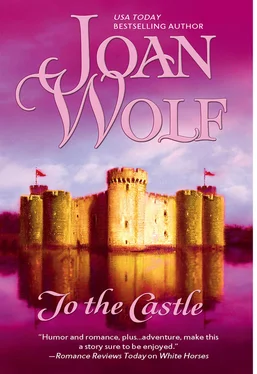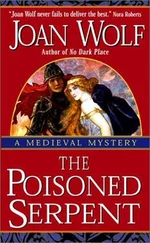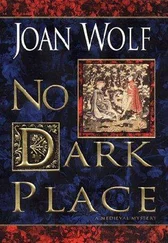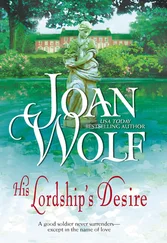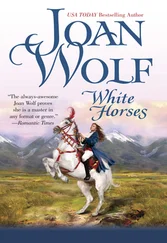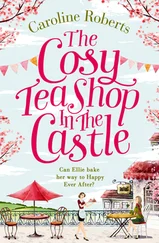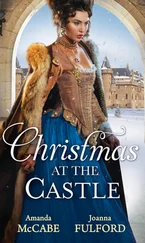Within a few minutes the earl’s party passed over the moat, between the gate towers, under the raised portcullis and into the outer bailey. This courtyard contained stabling for the knights’ horses, as well as the usual storehouses and buildings for workmen and castle defenders. There was even enough room in the huge bailey to house additional troops, should they be necessary for the castle’s defense.
While the knights dismounted in the outer bailey, Roger and his grandfather continued on horseback toward the inner wall, which was also built of thick stone, with a second gate barred by another iron portcullis. A square tower stood at each of the four corners of these inner walls.
The knight on guard called out, “Welcome home, my lord,” as the earl and his grandson rode through the gate and into the inner bailey. This courtyard surrounded the keep, a square stone edifice, four stories high, with four towers that rose another two stories above the main building.
Grooms came running to take the earl’s and Roger’s horses and the two men went up the steep stone ramp that led to the main door of the keep.
The first floor of the castle was given over to store-rooms, the second floor to guardrooms, where the knights lived, and the third floor to the Great Hall. Roger and his grandfather climbed one set of narrow stairs and entered into the hall where most of the activity in the castle took place.
The room was empty now, and no fire burned in the immense stone fireplace that was set on the far wall. The three other walls were hung with large wall hangings to keep out the damp and the floor was strewn with rushes and herbs. Two heavily carved chairs were placed on either side of the fireplace and in front of one of them a dog was sleeping.
“Gawain!” Roger cried, and the dog lifted his head. “It’s me, fellow,” Roger said. “I’m back.”
As he recognized the beloved voice, the dog stood up and raced across the floor to his master, barking excitedly as he ran. Roger squatted on his heels and the rush of the dog almost knocked him over. Roger laughed and tried to pat the dog, but Gawain was too excited to stand still. He circled Roger, still barking excitedly.
The earl said indulgently, “You would never know he was eleven years old.”
Roger laughed. “He’s like you, sir. He wears his age lightly.”
Finally the dog calmed down enough to stand and let Roger pet him. “I’m sorry I had to leave you for so long,” Roger said into the adoring brown eyes of the black-and-white mongrel. “But you’re too old to come anymore. You couldn’t keep up, fellow.”
“It’s just as well he doesn’t come,” the earl said. “I can imagine what my vassals would think when they saw that my grandson’s dog is a notched-ear mongrel.”
“He’s the best dog in the world,” Roger said without heat.
“He is a good dog,” the earl agreed. “He’s certainly devoted to you.”
“He knows who loves him.” Roger stood up and pulled off his helmet, revealing his dark gold hair. “It’s still two hours before supper. Would you like a drink of wine, Grandfather?”
“That sounds like a very good idea. My poor old bones are sore from so many hours in the saddle.”
The two men moved toward the chairs in front of the empty fireplace. The shutters were pushed back on the high, narrow windows to let in the afternoon sunlight. The door to the hall opened again to admit two pages.
“Come over here, lads, and disarm us,” the earl called, and the two pages hurried over to them. Both men stood patiently while the boys undid the laces on their mail hauberks and pulled them over their heads. Each hauberk was made of leather, with more than two hundred thousand overlapping metal rings sewn on it for protection. Neither man was wearing the long-sleeved mail shirt or mail leggings that made up full armor.
When they had been stripped to the comfort and the coolness of their tunics, the earl and his grandson relaxed with their wine and enjoyed the comfort of their own hall. The door opened again and an elderly man came in.
“Simon,” the earl called. “Come over here and tell us what has been happening in our absence.”
Simon, who had been the earl’s squire when he was a youngster and was now his steward, crossed the floor, a smile on his face. “My lord, how happy I am to see you safely returned.”
“Thank you, it is good to be home.”
Simon turned to Roger. “It is good to see you, also, my lord.”
“How are you, Simon?” Roger returned. “How have your joints been holding up?”
“I am well, my lord. The sore joints, well, God has seen fit to burden me thusly and I must live with it.”
The earl said, “Has anything happened in my absence that I should know about?”
“You received a missive from the Earl of Lincoln, my lord. It came last week. I knew you were coming home soon, so I didn’t try to send it on to you. Shall I get it for you?”
“The Earl of Lincoln.” The earl glanced at his grandson. “I wonder what this can be about.”
“Perhaps it’s something about the marriage,” Roger said.
“Get the letter, Simon,” the earl said.
“I have it in my own room, for safekeeping.” The man began to move stiffly in the direction of one of the towers and Roger and the earl fell into conversation.
“The wedding must take place soon,” the earl said. “Everyone will want it done before the empress Mathilda and her half brother, Robert of Gloucester, land in England to take up arms against King Stephen.”
Roger agreed with his grandfather, agreed that the marriage was a great coup for the family, and was faintly ashamed that the idea of it made him so nervous. He was more comfortable talking about the political situation. “If the empress and her troops can land,” he said. “Stephen is having all the major ports watched.”
“England has too long a coastline to watch all the places where a ship might land,” the earl said. “They will make the crossing from Normandy and land somewhere that Stephen isn’t watching. Then they will make their way to Bristol, which is Robert’s stronghold. From there they will send out their summons to those they hope will support them.”
“Who do you think will answer that call, sir?”
“Brian fitz Count will probably join them, but most of the earls will play a waiting game. Men like Rannulf of Chester will want to see which side can offer him the most. They have no honor, men like that. They all swore an oath to uphold Stephen and now they are only looking out for themselves.”
Didn’t you do that, Roger thought, when you forced the king to give the heiress of Lincoln to me in marriage to keep you loyal?
But Roger would never say that to his grandfather.
The earl was going on. “Rannulf of Chester owns a quarter of the kingdom already, and he will be looking to increase his holdings. He will be furious when he learns that Stephen is giving us the earldom of Lincoln. Rannulf was hoping the prize of Lincoln would go to his half brother, William of Roumare. William has a number of castles in Lincolnshire.”
Roger said, “You are supporting Stephen because you think he will be the best king for England, isn’t that so, Grandfather?”
“Certainly,” the earl replied. “Stephen is a man and a warrior and as direct a descendant of the Conqueror as Mathilda is. Mathilda may be the daughter of the old king, and Stephen just the nephew, but undoubtedly Stephen is the best man for England. The empress has never lived in England—the old king sent her to Germany to marry the emperor when she was a young child, and she has lived in Normandy ever since the emperor died. Her second husband, Geoffrey Plantagenet, is fighting for the rule of Normandy—he has little interest in England. It is Mathilda who wants England for her son.”
Читать дальше
